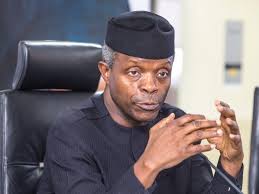From: Uche Usim, Abuja
Vice President Yemi Osinbajo has advised states and local government areas to urgently harness their untapped resources for greater economic development, as days of over-relying on the Federal Government for survival were gone for good.
Osinbajo also urged the two tiers of government to support the Federal Government in building a strong and diversified economy for all Nigerians, especially as the nation recently exited recession.
Speaking, on Monday, in Abuja, at the opening of a 3-day national workshop on alternative revenue sources for States and Local Government Areas, organised by the Revenue Mobilisation Allocation and Fiscal Commission (RMAFC), the Vice President, who was represented by the Minister of Finance, Mrs. Kemi Adeosun, said it was an unpleasant development that states depended solely on the Federal Government’s monthly subvention when they had abundant resources laying fallow in their domains.
According to her, the time had come for the states to look inwards and leverage on areas they have comparative economic advantage, so that they can provide jobs for the unemployed, grow their Internally Generated Revenue (IGR) and ensure better social services for their citizens.
The vice president, while describing the states as the engine for economic growth, urged them to imbibe fiscal discipline, transparency and hard work in order to move to the next level.
She said: “Days of collecting money from the federal government every month are over and over for good. We should adjust accordingly. We need to diversify into various areas like agriculture, mining, tourism and all that.
“We want to grow a vibrant economy for all. Not just for the rich but for all. And in doing that, the States and Local Government Areas are key. They must be fiscally sustainable and meet their obligations; not just in the payment of salaries. We even had challenge of paying salaries at some point. We are now laying a strong foundation for growth. We are assisting the states in this trying period through various programmes like the budget support facility, refund of Paris fund to states to clear backlog of unpaid salaries and also create room for development.
“The 22 reforms signed by states to cut costs and increase efficiency has benefitted those who heeded our advice. Independent monitoring has shown that. We urge those who haven’t imbibed these ideals to come onboard”, she explained.
In his remarks at the event, the Acting Chairman, RMAFC, Alh Shettima Umar Abba-Gana described the workshop as very key as it would enable participants seek ways of expanding revenue base of their respective states.
He said the agency was worried about the states’ over –dependence on statutory revenue allocation from the federation account, which exposed them to fiscal risks and distress.
“RMAFC is empowered by Paragraph 32(C) Part I to the Third Schedule of the 1999 Constitution of the Federal Republic of Nigeria (as Amended) forms the fulcrum of this workshop. “This is intended to identify the gaps in the funding of the States and Local Government Areas and also to sensitize participants on new strategies for internal revenue generation.
Over the years, we have mounted extensive advocacy and mass mobilization campaign throughout the states of the federation to sensitize governments at all levels on the need to adopt economic diversification for enhanced revenue generation, wealth creation and employment generation.
We have observed the trends of declining revenue in states because oil production and sale receipts have also dropped. So, funds for the government has dropped. We now need to diversify into other areas like agriculture, mining and others”, he stated.
Also speaking at the workshop, the representative of the Minister of Budget and National Planning, Bassey Ekpeyong said the programme was central in the implementation of Nigeria’s 2017-2020 Economic Recovery and Growth Plan (ERGP).
He said the current administration remained poised to push the states into seeking alternative revenue sources.
“The Buhari administration is poised to diversify the economy. Today, we are paying for the years we had so much revenue from oil and we did not diversify.
“States and local councils need to work hard. They should promote economic diversification”, he said.

